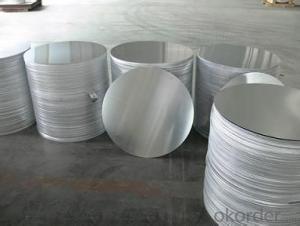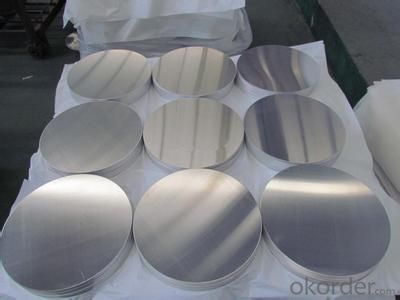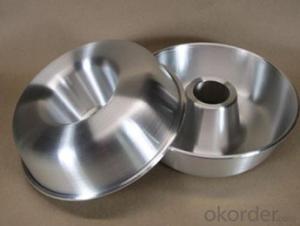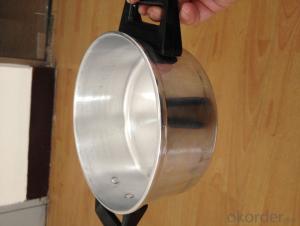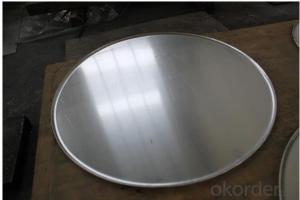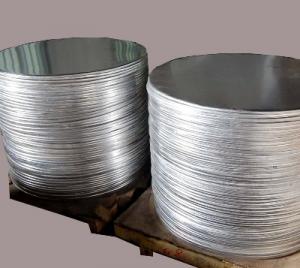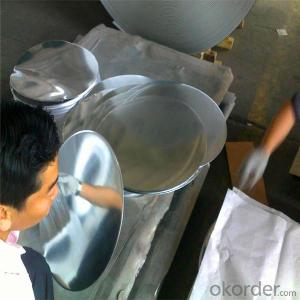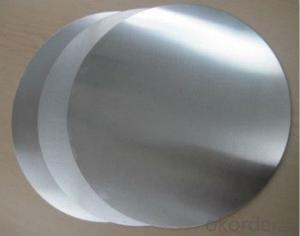Aluminum Coil Lowes Cold Casting Aluminium Circle for Cookware Material
- Loading Port:
- Shanghai
- Payment Terms:
- TT OR LC
- Min Order Qty:
- 2 m.t.
- Supply Capability:
- 60000 m.t./month
OKorder Service Pledge
OKorder Financial Service
You Might Also Like
Specification
Cold Casting Aluminium Cirlce For Cookware Material
Description
Thickess | 0.55MM-8.0MM,As your request |
alloy | Aluminum circle Alloy 1050,1060,1100,3003 |
Temper |
H12.H14,H16,H18,H24,H26.O |
Diameter |
80mm-1200mm |
Dimensions | can be produced according to your specifications |
Advantage | Though smelting, casting, hot-rolling, cold-rolling, heat-treatment, finishing and other technology, the heavy melting alminium and an appropriate quality of alloying elements is processed to light nonferrous metal material which has the characters of fine luster, good looing, light weight, poisonless and smellessncss, and it also has good propertles of transmitting electric current and heat, processing and corrosion-resisting Applicability |
Application | The product is widely used in cold-extrusion, Reflector, Traffic sign or deeply-drawing for making electric rice cookers, non-stick pans/pots, kitchens, cookware, cooking-utensil |
Packing detail | Export standard package, bundled or be required. The inner size of container is below: 20ft GP: 5.8m(length) x 2.13m(width) x 2.18m(high) about 24-26CBM 40ft GP: 11.8m(length) x 2.13m(width) x 2.18m(high) about 54CBM 40ft HG: 11.8m(length) x 2.13m(width) x 2.72m(high) about 68CBM |
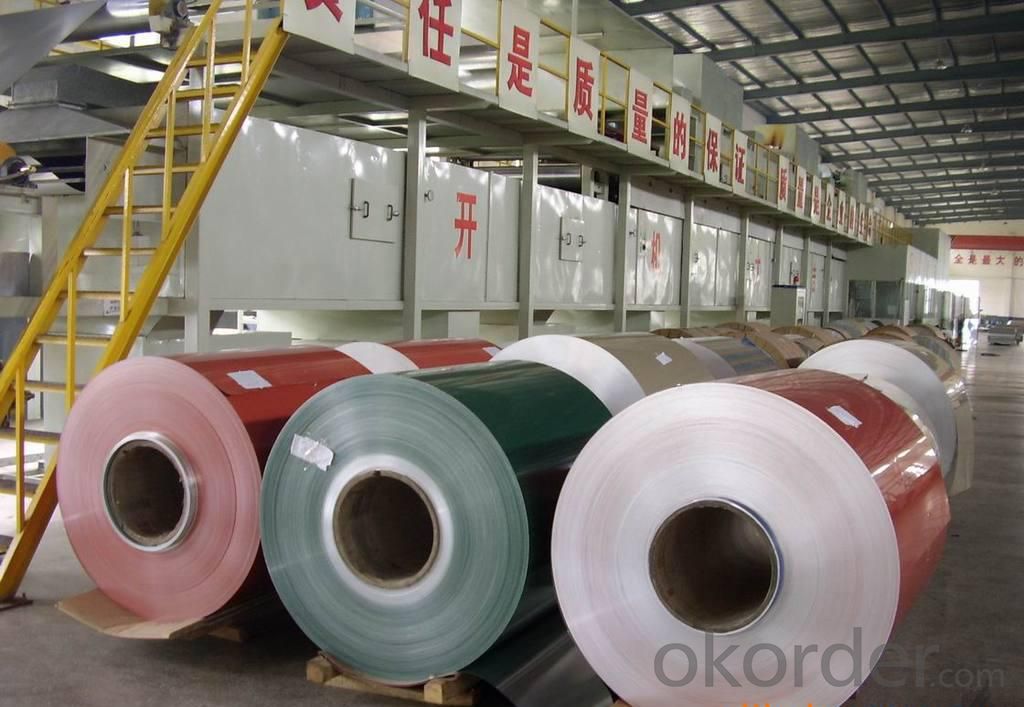
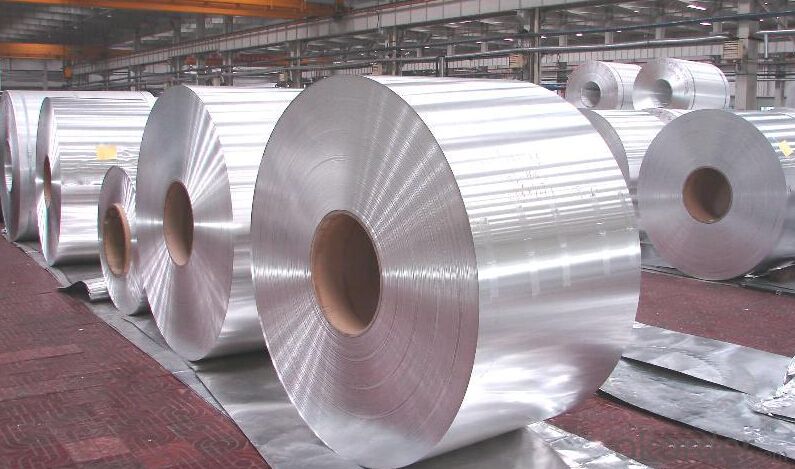
FAQ
--Q: Do you provide free samples?
--A: Yes, free samples will be sent to you on freight at destination.
--Q: Can I get your latest products catalogue?
--A: Yes, it will be sent to you in no time.
--Q: What is the MOQ?
--A: 2 tons
--Q: What are your payment terms?
--A: We accept L/C, T/T.
--Q: What kinds of alloy can you supply?
--A: 1000 series: 1050, 1060, 1070, 1100, 1145, 1200
3000 series: 3003, 3004, 3105, 3104
5000 series: 5052, 5083, 5754, 5182
6000 series: 6061, 6063, 6062, 6063
8000 series: 8011, 8021
--Q: What kinds of temper can you supply?
--A: O-H112: O,H12,H14,H16,H18,H22,H24,H26,H,32,H34,H111,H112
T3, T4, T6
- Q: Can aluminum coils be customized to specific requirements?
- Yes, aluminum coils can be customized to specific requirements. The customization process involves adjusting the dimensions, thickness, alloy composition, and surface finish of the coils to meet the specific needs of different industries and applications.
- Q: Is it possible to use an aluminum coil as a paperweight for holding down papers?
- <p>Yes, you can use an aluminum coil as a paperweight. Aluminum is a lightweight and sturdy metal that can effectively hold down papers on a desk. Its weight and shape make it suitable for this purpose. However, ensure the coil is clean and smooth to avoid any damage to the papers or surfaces it comes into contact with. Additionally, consider the size and thickness of the coil to ensure it provides enough weight to keep your papers in place.</p>
- Q: Are there any health or safety concerns related to aluminum coils?
- Aluminum coils can pose some health and safety concerns, especially in certain circumstances. One potential concern is the release of aluminum particles or fumes into the air, particularly during the manufacturing or processing of aluminum coils. Inhalation of these particles or fumes can potentially lead to respiratory issues or lung damage. Additionally, aluminum coils that are damaged or corroded may release aluminum ions into food or beverages, which can be harmful if ingested in excessive amounts. However, it is important to note that the risks associated with aluminum coils are generally minimal and can be mitigated through proper handling and maintenance. For instance, manufacturers typically employ various safety measures to prevent the release of aluminum particles or fumes during production. Furthermore, aluminum coils used in heating, ventilation, and air conditioning systems are typically coated or treated to prevent corrosion and the subsequent leaching of aluminum ions. To minimize any potential health risks, it is recommended to follow safety guidelines provided by manufacturers, such as wearing appropriate protective gear during handling, and ensuring proper ventilation in areas where aluminum coils are processed or installed. Additionally, regular inspection, cleaning, and maintenance of aluminum coils can help identify and address any potential issues before they become a health or safety concern. In conclusion, while there are some health and safety concerns related to aluminum coils, these risks can be managed through proper handling, maintenance, and adherence to safety guidelines. It is always advisable to consult with professionals or manufacturers for specific instructions and recommendations related to the utilization and maintenance of aluminum coils in order to ensure maximum safety.
- Q: What is the thickness range of aluminum coils?
- The thickness of aluminum coils can differ depending on the particular application and industry. Generally, aluminum coils range from 0.006 to 0.25 inches (0.15 to 6.35 mm) in thickness. This wide range enables diverse uses, ranging from delicate and lightweight applications like packaging materials or electrical components to thicker coils utilized in construction or automotive sectors. It should be emphasized that these are broad ranges, and the desired thickness may vary depending on the specific use and customer requirements.
- Q: Can aluminum coils be anodized?
- Yes, aluminum coils can be anodized. Anodizing is an electrochemical process that enhances the natural oxide layer on the surface of aluminum, making it thicker, more durable, and resistant to corrosion. This process is commonly used for aluminum sheets, plates, and coils. Anodizing can be performed on both flat and formed aluminum coils, providing them with a range of attractive colors and finishes. The anodized coating also improves the aluminum's ability to accept paint and adhesives, making it a popular choice for various applications such as architectural cladding, automotive trim, and electronic components.
- Q: Are aluminum coils resistant to impact damage?
- Yes, aluminum coils are generally resistant to impact damage. Aluminum is known for its high strength-to-weight ratio and excellent durability, which makes it less susceptible to impact damage compared to other materials. Additionally, aluminum coils are often used in various industries where they are exposed to various environmental conditions and handling processes, and they are designed to withstand such impacts without getting damaged easily. However, it is important to note that the level of resistance to impact damage can vary depending on the specific thickness, quality, and design of the aluminum coil.
- Q: What are the weight and length specifications of aluminum coils?
- The weight and length specifications of aluminum coils can vary depending on the specific type and purpose of the coil. Generally, aluminum coils can range in weight from a few hundred pounds to several thousand pounds. The length of aluminum coils commonly varies from a few hundred feet to several thousand feet. However, it is important to note that these specifications can be customized based on the requirements of the application or industry they are intended for.
- Q: What are the common surface treatments for aluminum coils in the marine industry?
- Aluminum coils in the marine industry undergo different surface treatments to improve their durability and resistance to corrosion. Anodizing, powder coating, and chemical conversion coatings are some of the most commonly used methods. Anodizing, a popular technique, forms a protective oxide layer on the aluminum surface through electrolysis. This layer not only enhances corrosion resistance but also improves abrasion resistance and appearance. Anodizing allows for customization and aesthetic appeal as it can be done in various colors. Powder coating is another widely employed surface treatment for aluminum coils in the marine industry. It involves applying a dry powder to the aluminum surface, which is then cured under heat to create a durable and protective layer. Powder coating provides excellent resistance to UV rays, chemicals, and abrasion, making it suitable for marine applications in harsh environmental conditions. Chemical conversion coatings are also commonly used on aluminum coils in the marine industry. These coatings are formed through a chemical reaction between the aluminum surface and a solution containing specific chemicals. The resulting coating offers excellent corrosion resistance and acts as a barrier against moisture and other environmental factors. Chemical conversion coatings are often used as a pre-treatment to enhance the protective properties of aluminum coils before applying other coating systems. The choice of surface treatment for aluminum coils in the marine industry depends on factors such as the intended application, environmental conditions, and desired aesthetics. Anodizing, powder coating, and chemical conversion coatings are the most common options, each providing unique benefits to ensure the longevity and performance of aluminum coils in marine environments.
- Q: I need to make aluminum powder that is fine! I don't have a mill to use or something like that. If I fill literally the whole coffee blender, will that get it fine? I want to make an ok amount of it. I tried to use sand paper which makes it as fine as I want it but takes a while of sanding.
- How to make fine aluminum powder?
- Q: Can aluminum coils be used in the production of electrical transformers?
- Yes, aluminum coils can be used in the production of electrical transformers. Aluminum coils offer several advantages such as being lighter in weight, having better thermal conductivity, and being more cost-effective compared to traditional copper coils.
Send your message to us
Aluminum Coil Lowes Cold Casting Aluminium Circle for Cookware Material
- Loading Port:
- Shanghai
- Payment Terms:
- TT OR LC
- Min Order Qty:
- 2 m.t.
- Supply Capability:
- 60000 m.t./month
OKorder Service Pledge
OKorder Financial Service
Similar products
Hot products
Hot Searches
Related keywords
